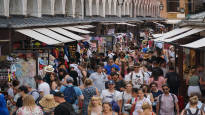Residents fed up with overcrowding and rising prices have protested ahead of the busiest tourist season in Venice.
Venice is preparing for a record tourist season. This year, the city also attracts art lovers. The Venice Biennale opened last month and is open until November.
For the city, it means an estimated 30,000–50,000 daily visits, income on the one hand, and crowding on the other.
This spring, residents who have been employed in tourist armies have shown their opinion exceptionally strongly. Politicians also take advantage of boredom. EU critic and comedian Beppe Grillo has called for the separation of Mestre, Venice on the Venetian mainland, and the center of Venice.
– The local administration is debating how the disadvantages of tourism could be reduced, how to share the costs, for example the costs of waste management, between the two districts, explains the American historian in a telephone interview with Dennis Romano.
Professor Emeritus of Syracuse University, Romano has written a fascinating 600-page work Venice – The Remarkable History of the Lagoon City (Venice – The Remarkable History of the Lagoon City, University Press 2024).
In Venice, the far-right factions are especially courting the voters, the prime minister of the Italian Brothers party by Giorgia Meloni winged by success. The prime minister, who is popular across party lines, is a candidate in the EU elections.
Venice has been a busy port for immigration and shipping for thousands of years. The newcomers belong to an international city, while the Venetians themselves recognize the value of their hometown among the most popular destinations in the world.
– The identity of many residents is based on a special Venetianness. “Venezianità” is an awareness of one’s own special quality, which can take many forms, from nurturing a dialect to the local press raving about tourist jabs. This feeling, conservatism and also anti-immigration, especially the right-wing parties want to feed, Professor Romano explains.
The professor reflects that anti-foreigners in Venice have been increased by the growth of mass tourism.
– When a resident can’t fit into a local bakery or cafe, the culprits are usually foreigners, whether they are tourists or workers.
Locals want to stand out from the crowd even with a sign that says they are Venetian. Some restaurants announce in the window that pizza, lasagna or other tourist menu items are not available.
In the vortex of globalization, radical ideas also gain support. The Liga Veneta party, founded in 1979, even advocates full independence for Venice and embraces the restoration of the ancient Venetian Republic.
Effective means of reducing the disadvantages of mass tourism have hardly been heard from the ranks of any party.
A tourist tax of five euros is hardly a solution
The flip side of mass tourism is the tourism euros left in Venice. Professor Romano reminds that the parties are not clearly divided into factions that oppose tourism or support it.
– Diversifying the economic structure would reduce dependence on tourism income, but there are no alternatives in sight.
Romano welcomes the tourist tax, but it does not bring a solution to repairing and preserving Venice’s infrastructure, which is slowly sinking into the sludge of the lagoon.
– People want to see St. Mark’s market and the palaces. They are willing to pay for them. Balancing between learning about cultural heritage and restrictions is difficult. For example, the middle class in Asia is growing and traveling, who has the right to reject visitors, ponders Professor Romano.
The slogan “Open city Venice” is a laughing stock for the residents
So there are no easy solutions.
Marina Rodino has lived in Venice for 30 years. He, too, does not expect the entrance fee to ease the crowding of the lagoon city. Rodino lives near the iconic Rialto Bridge. Most of the apartments are now in short-term rental use, like in Barcelona, Lisbon and Amsterdam.
– The meat shop has had to close. Especially young people come to the bridge for aperitifs in the evenings, despite the entrance fee, says Rodino in an interview with news agency AP.
For him, the advertising slogan “Open City Venice” represents the opposite.
– According to the Italian constitution, residents have the right to move and live freely on national soil. Now here lies the irony. This is not a natural attraction, not a museum, not Pompeii, but a city that belongs to families and where shops are open, concludes Romano.
AP, Reuters
